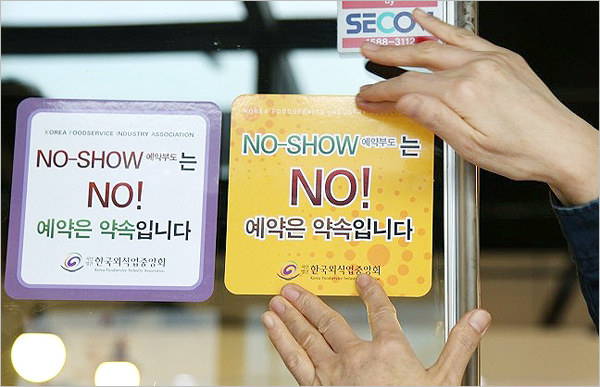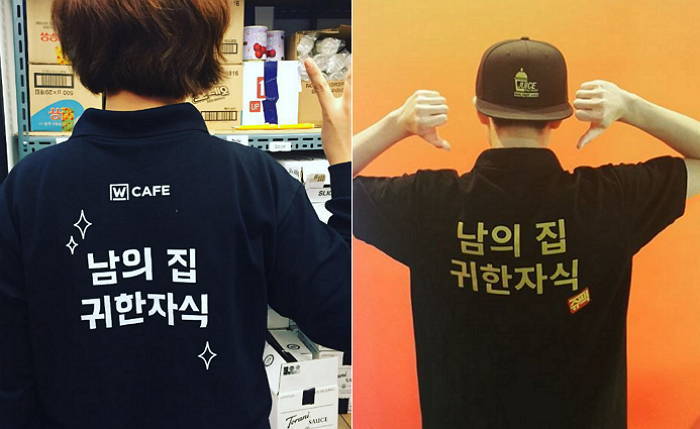
“Customer is king”. These words were often heard in the service industry until recently. Workers used to receive training on how to meet consumer demands regardless of their manners. Employees were told to keep smiling to consumers. In addition to workers, consumers used to believe that they deserved royal treatment considering it as consumer rights because they were spending money. Recently, however, some workers are standing up for their rights, too. They are no longer accepting unethical behavior such as throwing a hamburger at a worker’s face, the grounding of an airplane because of peanuts, and so on. The time of change is upon us. Many people are criticizing these types of behavior and pushing for society to become ‘conscious consumers’, not just consumers. Then, what does a conscious consumer look like?

Not Your Worker
One of the popular words in Korea in 2018 was balance. Balance refers to the state of being stable, not tilting or biased. While the word has been used in the past, only since last year did balance start being used more frequently among people. In particular, the emergence of the millennial generation has increased the idea of balance in one’s life because they believe personal development, personal happiness, and small pleasures in the present are more important than group development and happiness or great happiness in the future. In 2018, the importance of balance in the field of labor became prominent. ‘Wolibal’, an abbreviation of WOrk and LIfe BALance, is an expression aimed at balancing work hours and personal life development. Because workers were constantly arguing for this ideal, the government revised legislation related to workers. Changes in legislation include limiting the work week to 52 hours and a bill that raises minimum wage. In other words, in 2018, the coined expression Wolibal emphasizes a balance in the quantity of labor. Then, what type of balance are workers seeking in 2019? This year, balance centers around quality, not quantity.
In the past, Wolibal referred to a quantitative balance between work and life, but this year Wocubal, an abbreviation of WOrker and CUstomer BALance, places more importance on a qualitative balance. Especially, with the number of ‘Gapjil’ cases increasing, voices calling for Wocubal are growing in volume. The term ‘Gapjil’ refers to an unfair act in which the Gap, a person who has hierarchical authoritative power, orders Eul, a person lower in power. The gapjil between employers and employees has always been controversial, but from the standpoint of Wocubal, the goal is looking at the relationship between consumers and workers. Some consumers have tossed food or hurled insults at workers because they didn’t like food they ordered or they weren’t satisfied with the worker’s service. Park Seonyoung, a telephone consultant said, “The hardest thing when responding to insensitive consumers is the ranting and swearing. More recently, there are some people who speak overly sexually to consultants on the phone. Listening to these types of language, my self-esteem lowers, and I think of myself as a trivial person. In addition, many people repeatedly request irrational demands, and they refuse to listen to my words or advice. It is really difficult and hard.” Gapjil is on the rise, and what is more problematic is that the type of gapjil has become violent, which makes the voice of Wocubal even more important. Legislation and law changes could help Wocubal like Wolibal; however, Wocubal is more individualistic because it is related to problems between individuals. As such, conscious-raising about the responsibilities of being a conscious consumer is important. Then, what is a conscious consumer and how can individuals become conscious consumers?
Just Consumer, Not the Gap (㕅)
The word conscious consumer originates from Wocubal, and it means a consumer who keeps a certain level of manners. Anyone who doesn’t display bad manners (gapjil) can be a conscious consumer. Then, what kinds of gapjil could cause us to become unconscious consumers? The first is emotional labor. Emotional labor is dealing with overly emotional customers. In particular, when managing consumers in person at department stores or via the phone, workers must suppress their personal feelings and always show kindness to consumers. In fact, according to a survey on Saramin of 629 workers, 77.7% said they have difficulties performing emotional labor at work. Moreover, the fields in which workers should perform emotional labor were diverse and included industries of service, purchasing, manufacturing, advertising, public relations, and so on.1) In other words, there is no work field exempt from emotional labor. However, in recent years, consumers are abusing the workers’ kindness. Customers are throwing dishes at workers, complaining about not receiving free refills, calling them and using foul language on the phone without any reason, and these cruel behaviors are growing in society. The situation is so serious that the human rights of workers are being demolished.

Translated to 'No-Show is bad! A reservation is a promise'
The second type of gapjil is the no-show phenomenon, which refers to the action of consumers who don’t appear even though they made a prior reservation at a restaurant or hair salon. No-shows are becoming increasingly serious, so the Korea Foodservice Industry Association created a campaign advert with the slogan “No-Show is bad! A reservation is a promise”. Unfortunately, the campaign has yet to be effective. In fact, the economic damage from no-shows reached 8 trillion won per year, but it also causes other damages besides the economic damage.2) For instance, at a restaurant, reserved seats are not available for waiting customers, and ingredients that were prepared ahead of time cannot be reused. In addition, because of no-shows, consumers who wish to use certain services cannot. During holidays such as Seollal (Lunar New Year) and Chuseok (Korean Thanksgiving Day), many trains depart with vacant seating due to no-shows. In fact, according to Korea Railroad, 615,000 tickets were not used in 2016 and 757,000 in 2017, which is an increase of 23%. If these situations had not happened, people who truly need a ticket could have bought one and gone to visit family or traveled.

Photo of Venice's residents' protest towards tourists
The third type of gapjil is ‘Overtourism’. Overtourism leads to anti-tourism sentiment because too many tourists visit a local area and interrupt the lives of local residents. Also, as the area becomes invaded by tourists, its unique culture of the region disappears. The local spirit is replaced with cafés, restaurants, and souvenir shops that serve and attract tourists. Some tourists regard the local housing as sightseeing spots and open homeowners’ doors without permission. Residents have begun to voice loud complains. In addition to invading the privacy of residents, tourists also make noise and leave behind a lot of garbage, causing ‘Touristification’, a term for residents leaving their home to avoid the tourism problems. A typical example is Venice. In fact, the city of water, due to tourism has had a one-third reduction in its population from 170,000 over the last 60 years.3) While not everyone left Venice due to tourism, tourism can be one of the factors. In the case of Korea, a similar reduction is occurring in Bukchon Village in Seoul and Gamcheon Culture Village in Busan. Indeed, tourism has revitalized the commerciality of the areas, but residents are becoming increasingly uncomfortable.
Respect Me, and I’ll Respect You
The best way to protect workers from increasing numbers of unconscious consumers is the advent of conscious consumers. However, because of the increasing numbers of ill-mannered customers, companies and employers have started to take measures. First, companies have established various initiatives that protect workers. The most prominent one is the creation of manuals on how to deal with impolite customers. Park Seonyoung, who works as a phone agent, said, “Most companies have a customer response manual. At our call centers, we have a separate department that is responsible for impolite or offensive consumers, and the department receives specialized legal education and regular psychological counseling. The creation of a manual helps them respond faster.” As she discusses, companies are also creating special departments to deal with unconscious consumers, providing legal education and offering psychological counseling for workers. In addition, GS Caltex has created the dial tone “Your faithful and nice daughter will assist you” instead of the previous general dial tone through the project ‘Dial Tone Linking the Hearts’. Lee Donggwi, a professor of psychology at Yonsei University said, “After introducing the new dial tone, GS Caltex counselors’ stress decreased from 79% to 25%, and workers said they felt like they were being respected by consumers.”4) Like GS Caltex, a number of companies are making systems that protect their workers in accordance with the types of each company’s services.

Translated to 'Someone's precious child'
The second is effort by owners. Even though a company creates a manual, it is difficult for the company to manage every possible situation at each chain store. Therefore, every store owner emphasizes Wocubal by posting the following comment “If you talk down to our workers, our workers will treat you with the same disrespect.” In addition, owners are adopting other measures that protect their workers by adding the words ‘Someone’s precious child’ to office uniforms. Park Seonyoung said, “Effort on the part of shop owners has reduced the number of incidents. However, since consumers sometimes can’t see the paper or uniform properly, it is important to emphasize them by highlighting by bigger or reddish letter. Also, I hope employers also work to educate their short-term staff on how to respond more effectively to bad situations.” Like Park’s opinion, there is a need to better inform the public about changes in company attitudes and train workers according to new company policies so that employees respond rationally rather than emotionally when a situation arises.
Despite the complex effort by companies and employers, the most effective and important change is consumer perception. As mentioned above, since Wocubal is a problem between individuals, there is a limitation to what a company or store owner can do. Therefore, consumers must change their perceptions and respect workers. If consumers don’t change, proper balance will be difficult to obtain. Becoming a conscious consumer is not difficult if consumers place themselves in workers’ position. Also, consumers should keep appointments, but if they can’t, they should contact the company in advance. In addition, all the regions can achieve a good balance once harmony is achieved between residents and tourists. However, grievances can exist such as dissatisfaction with provided services or products, but the complaints should be made out of concern for public interest and as a ‘conscious consumer’, not an ‘unconscious consumer’.

Rights Mean Responsibilities
What kind of consumer are you? Have you ever gotten angry at an employee because you didn’t like their attitude, performed a no-show due to a change in your schedule, or ever been overly noisy and littered in a residential area popular with tourists? Keeping one’s manners as a consumer is not difficult. Consumers pay for food, beauty products, and others, but they don’t pay for employees’ smiles or kindness. There is no price on those expressions, so consumers should not rudely toss food or swear at employees who may not have a smile on their face. Keep in mind that a customer can gain consumer rights if they act responsibly as a conscious consumer.
1) Park Jihye, “77.7% of Employees, “We Are Emotional Workers””, Prime Economy, December 7, 2018
2) Kim Minsung, “Trend Korea 2019… 2019 Forecast of Seoul Consumer Trend Analysis Center”, Future Korea, November 6, 2018
3) Seo Yeong-a, “Overtourism”, DongA Ilbo, March 22, 2019
4) YTN Science, “Wocubal… Makes Conscious Consumers”, January 16, 2019


